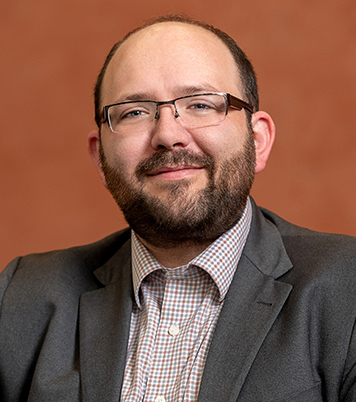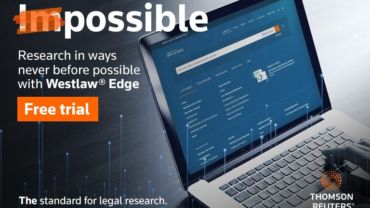Joe Regalia, of UNLV's Boyd School of Law, calls his approach to teaching "human-centered", part of a strong fascination with improving the world around him
Driving innovation has defined Joe Regalia’s career, part of his lifelong fascination with how to improve things around him.
“This obsession for me started when I was a kid,” he explains. “I spent a lot of time in the hospital growing up, and I was struck by how many kids didn’t have access to books. I must have been 11 or 12, and I started this organization that collected books and set up carts in hospitals for kids. And from then on, I had this conviction that said, ‘Look, any of us can innovate. We can see a problem, find a new solution, and make it happen.’”
An associate professor of law at the William S. Boyd School of Law at the University of Nevada-Las Vegas (UNLV), Regalia calls his approach to teaching human-centered. “Everything I teach, I try to bring back to the people: The people we are persuading, the people we are affecting, and the cognitive science that sheds light on how all of us process information,” he says. “So, when we are writing a demand letter, we are thinking about the human element — not just the legal stuff.”
He emphasizes the benefits of incorporating technology and innovation, alongside strong writing, into the practice of law. One way he helps students bridge the gap between law school and legal practice is by using a blended classroom, including his Lawyering Process Class, which is UNLV’s version of a first-year Legal Research & Writing course.
“Rather than just write a brief and focus only on traditional research and writing exercises, students also work on longer-term projects that give them tools they need to innovate — to look at problems and find new answers to them,” Regalia explains. “Teams of my 1Ls build a document-automation app to help pro se folks in our community. These teams had to go through the process of identifying problems in our community that needed innovating, they had to work together to come up with an innovative solution, and then they had to plan out and build that solution.”
Learning traditional legal skills
Throughout this exercise, students learned all the traditional skills of writing, researching, and analyzing the law, Regalia says. “But they also worked on building wider-ranging tools that go beyond all that to help them solve new problems in new ways,” he adds. “Like how to find solutions as a team, and how to integrate technology into lawyering.”
In evaluating students’ writing skills, Regalia noticed many needed help to develop a sense of what’s important and how to focus their readers on that. He observed a disconnect — evident in both students and lawyers — between the work product attorneys prepare, and the functional aspect of what judges or clients want to see in the documents.

To better sharpen students’ writing skills early in law school, Regalia recently launched the Write.law platform, which compiles years of his research in legal writing. The platform also features tools that law students and lawyers can use not just for their writing and presentations, but for innovating and using new technology as well.
Indeed, Write.law reflects another hallmark of Regalia’s teaching style: empowering students to see how much they can accomplish on their own. He hears from former students who tell him that his classes prepared them for practice and positioned them as the go-to attorneys in their firm around the use of technology. “They feel so empowered,” Regalia says. “People are looking to them to say, ‘How do I do this stuff?’”
Regalia admits he takes great satisfaction in hearing this. “What makes me love being a law professor so much is those stories,” he says. “When students come back and talk concretely about a principle, concept or tool they’re using, it’s the best.”
Last semester, there was even a “silver lining” of sorts with the COVID-19 pandemic, because the crisis underscored how important technology is for lawyers and law professors, as well as the importance of being adaptable, he notes.
In fact, one student distilled that feeling into an email to Regalia about legal work during the pandemic that read: “This is a prime example of why it’s so important to be well-versed in managing technology, and you are my only professor thus far in law school that has emphasized the importance of it. Thank you for making me comfortable with technology and using different platforms, for this is what makes this already stressful time, a little less stressful.”
Another potential benefit was how the crisis forced people to suddenly do things differently, which may make everyone more open to change and innovation moving forward, he notes. This mindset will be key to legal education innovation, Regalia says, adding that as law schools consider what’s next for evolving legal education, the first step is embracing innovation both as a tool and as a discipline. “We need to understand more of business, regulation, and the human factors, and how all this comes together with law,” he says, adding that embracing technology is another big piece. “We are seeing the rampant acceleration of tech adoption in the legal field right now,” he observes. “For law schools, that means embracing tech more as a tool for teaching, a skill to equip law students, and a field of study.”
Regalia says he is encouraged by approaches like his partnership with other faculty from various institutions and the law school division at Thomson Reuters in building an online certification program to better introduce new law students to legal research. Through this partnership, he feels that legal research service vendors are invested in education as well, Regalia says. “I also hope more partnerships between legal education and the public and private sector come out of this,” he explains, adding that one of the many lessons of innovation is the power of collaboration and information.
“So, closing the gap between what we are teaching and what the public and private sectors need out of our law students is a core mission for me, certainly.”







